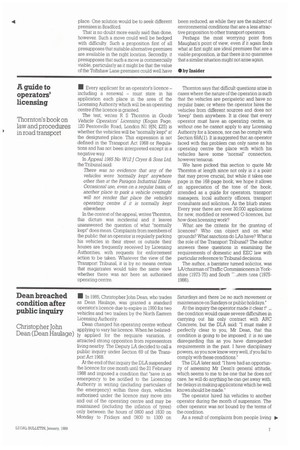A guide to operators' licensing
Page 93

If you've noticed an error in this article please click here to report it so we can fix it.
Thornton's book on law and procedures in road transport
• Every applicant for an operator's licence including a renewal must state in his application each place in the area of the Licensing Authority which will be an operating centre if the licence is granted.
The test, writes R S Thornton in Goods Vehicle Operators' Licensing (Kogan Page, 120 Pentonville Road, London NI 9JN; £25) is whether the vehicles will be "normally kept" at the designated place. This expression is not defined in the Transport Act 1968 or Regulations and has not been interpreted except in a negative way.
In Appeal 1985 No W12 J Cryer & Sons Ltd, the Tribunal said: There was no evidence that any of the vehicles were hormally kept' anywhere other than at the Paragon Industrial Estate. Occasional use, even on a regular basis, of another place to park a vehicle overnight will not render that place the vehicle's operating centre if it is normally kept elsewhere.
In the context of the appeal, writes Thornton, this dictum was incidental and it leaves unanswered the question of what "normally kept" does mean. Complaints from members of the public that an operator is regularly parking his vehicles in their street or outside their houses are frequently received by Licensing Authorities, with requests for enforcement action to be taken. Whatever the view of the Transport Tribunal, it is by no means certain that magistrates would take the same view whether there was not here an authorised operating centre. Thornton says that difficult questions arise in cases where the nature of the operation is such that the vehicles are peripatetic and have no regular base; or where the operator hires the vehicles from different sources and does not "keep" them anywhere. It is clear that every operator must have an operating centre, as without one he cannot apply to any Licensing Authority for a licence, nor can he comply with Section 69A(1). It is suggested that an operator faced with this problem can only name as his operating centre the place with which his vehicles have some "normal" connection, however tenuous.
We have picked this section to quote Mr Thornton at length since not only is it a point that may prove crucial, but while it takes one page in the 168-page book, we hope it allows an appreciation of the tone of the book, intended as a guide for operators, transport managers, local authority officers, transport consultants and solicitors. As the blurb states: Every year there are over 30,000 applications for new, modified or renewed 0-licences, but how does licensing work?
What are the criteria for the granting of licences? Who can object and on what grounds? What sanctions do LAs have? What is the role of the Transport Tribunal? The author answers these questions in examining the requirements of domestic and EEC law with particular reference to Tribunal decisions.
The author, a barrister turned solicitor, was LA/chairman of Traffic Commissioners in Yorkshire (1973-75) and South .stern area (19751986).
































































































